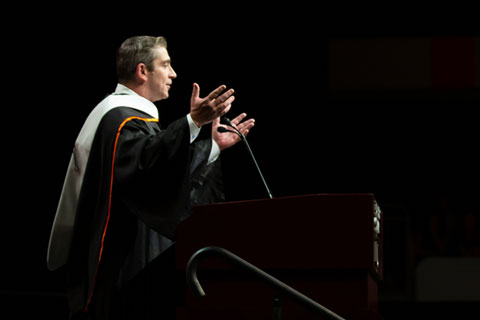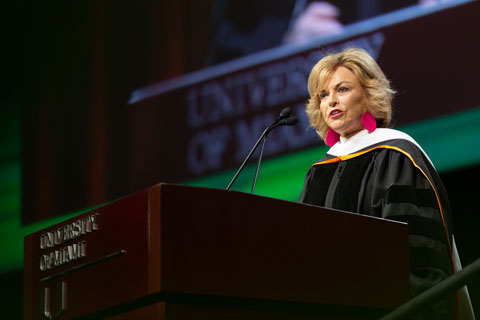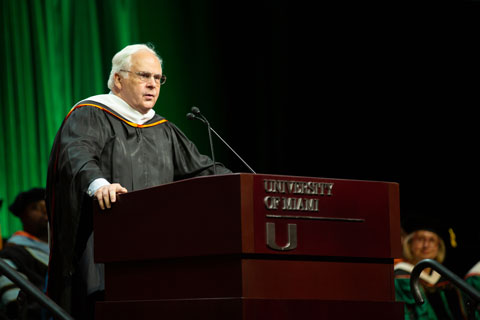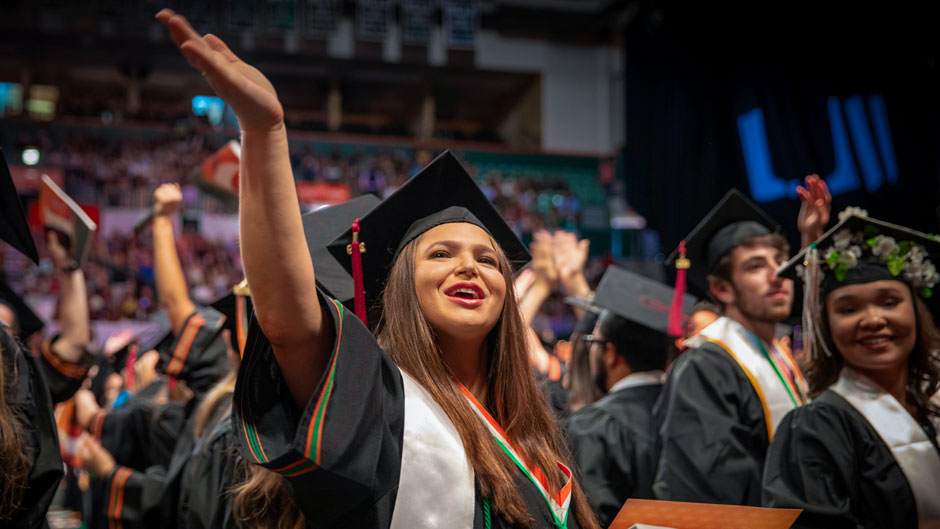It was his song to graduates, his way of commemorating the moment.
After all, they were “the stars of the day,” the newest educators in their respective fields. And Richard Blanco, the Miami-raised poet, public speaker, and civil engineer who recited the powerful poem “One Today” at President Barack Obama’s second inauguration, wanted to honor them with prose inspired by them.

The son of a working class immigrant family that moved from Cuba to Madrid in 1968, Blanco received an honorary doctor of humane letters at the first of three undergraduate degree ceremonies on Friday.
Standing on the Watsco center stage, he told students his poem was “a moment of passing the torch in some way.” The outspoken activist for diversity, immigration, and LGBTQ rights who is now an associate professor of English at Florida International University and has written the recently released book "How to Love a Country," then read for students:
Teach Us, Then
We taught you: how to unravel the spin of our galaxy and unwind the spirals of our DNA; how to spy on the invisible splitting of atoms and the bloom of our dividing cells; how to listen to the footsteps of our history marching through all the firestorms and tearstains of our wars.
We taught you how to savor all the colors of a painting, taste our insatiable desire to render the beauty of our pain, and pain of our beauty; how to appreciate the art of algebra, and the algebra of art; how to dance with a poem, let it lead you though the rhythms of your life with all its beats of joy and pauses of sorrow.
We taught you: how to stare into the mirror of the moon and trust the light shimmering in your eyes. How to decipher the creases of your palms and the wrinkles of mountains; how to listen to the truth of your thoughts as certain as the will of roaring waves.
We taught you how to teach yourselves, hoping someday you will teach us all that we couldn’t teach you. Teach us, then: today, tomorrow, and tomorrow, and tomorrow.
Teach us: how to remap the world without borders that cage people in the colors of their countries without enough, though there is enough for all of us; how to melt our bullets into bells, let them ring a resounding end to the subject of blood in our classrooms.
Teach us: how to beseech all the life we’ve named, studied, and endangered: bless the pandas’ pantomime, bless the tigers’ stalking eyes, bless the wails of our blue whales; how to make peace with them, with each other, and with the earth so that we may not become as endangered as we are estranged from one another.
Teach us: how to stop thinking of ourselves as red and blue states shouting at each other; how to look instead into each other’s eyes this morning, and tomorrow morning, and every morning, and see not what we are, but who we are.
Teach us: how to say: I see you (not because you’re a man or a woman or anything in-between); how to say: I see you (not because you’re black or white or anything in-between); how to say: I see you (not because you’re straight or gay or anything in-between).
Teach us, then: how to see each other, how to love, how to reach the stars, together.
Blanco’s poem moved many in attendance, including Alexander Margetts, a neuroscience major from Parkland, Florida.
With his parents watching from the Watsco Center bowl, he marched across the arena stage to accept his degree, the embodiment of what Blanco described as the educators of tomorrow. His four years of undergraduate study are now complete, but his journey to becoming a neurosurgeon is still in the beginning stages.
During three years of academic endeavors at UM, the 22-year-old Margetts, an alumnus of Marjory Stoneman Douglas High School in Parkland, where a mass shooting left 17 people dead in 2018, conducted research at the Miller School of Medicine’s Miami Project to Cure Paralysis. His goal: to determine if a combinatory treatment of human Schwann cells and neural stem cells in rats could regenerate neurons and improve motor function following spinal cord injury.
UM, he said, opened his eyes to the field of neuroscience.
“I’ve always thought of myself as someone who likes a challenge,” he said before the start of Friday’s morning ceremony. “Throughout high school and my first year at UM, one thing that was always drilled into us is that there’s still not a lot we know about the brain. We know what functions it performs. We know a little bit about how it does it. But there’s so much unknown about it. As somebody who thinks critically and wants to be a scientist, I thought, “Why not go into this field? You can really make a difference this way.”
He’s been accepted into the Miller School’s Ph.D. program and will continue his work at the Miami Project. But even over all the research he undertook as an undergraduate, it was the power of involvement he considers his biggest accomplishment at the University.
In the wake of the Stoneman Douglas tragedy, Margetts channeled his energy, helping to organize and host This Is America: Mass Shooting Memorial, an event in which UM students converted the Shalala Student Center Ballroom into a setting that mirrored recent tragic shootings in the nation—from Sandy Hook to the Pulse Nightclub to Virginia Tech.
“It was our way of raising awareness,” said Margetts.
Palestinian and Jordanian-American Serene Shehadeh, the student speaker who received her degree in biology and hopes to go on to medical school, said her four years at UM have changed her.
“I’m not the same person who came here in 2015, when my father dropped me off at Hecht Residential College,” she said. “I’ve grown in terms of confidence and leadership.”
At the midday ceremony for the schools of Architecture, Communication, and Education and Human Development, as well as the Frost School of Music and the Rosenstiel School of Marine and Atmospheric Science, Pat Mitchell, the first woman to serve as president of PBS, told graduates: “You can’t be dangerous from the sidelines.”

A media icon who has focused on using her industry as a force for social change, with a special emphasis on the representation of women’s voices and stories, Mitchell described herself as “a dangerous woman.”
“I’m here today to inspire you to become dangerous, too, because we’re living in dangerous times, and such times call on us to be bolder, more daring, braver in our solutions and responses,” said Mitchell, who received an honorary doctor of humane letters.
Being dangerous, she explained to the graduates, doesn’t mean being feared or fearful, but more fearless. “I don’t mean abusing power, but I do mean using it, sharing it to empower others and speaking up and showing up for those without voice or representation,” she said.
“I believe that’s what’s necessary now to change the world that you are moving into today,” Mitchell continued, noting that the planet is one of rising sea levels and polluted oceans.
Racism, sexism, nationalism, and gender-based violence are on the rise, she said.
“Compassion, civility, and empathy are declining,” she said. “But the good news is you, more than most, are prepared to be the risk takers, the change makers, the problem solvers. You are prepared to be as dangerous as you need to be to change the world you enter today.”
She called on Rosenstiel School graduates to bring new ideas and solutions to the climate change, describing the problem as the “existential threat to our lifetime.”
Mitchell urged nursing and health studies graduates to go to the danger zones to deliver the health services all people need, saying they are better prepared for growing weather-related emergencies, as they were on the frontlines when Hurricane Irma struck.
“Put climate justice at the center of all your designs,” she told architecture students, noting that dangerous climatic conditions have already displaced some populations, creating climate refugees. She implored them to meet sustainable challenges with new innovations and new technologies for resilient communities.
She called on education graduates to challenge the ways we have learned by what they learned in UM’s classrooms and communication students to be intentional about the media they create and consume.
The world, she said, needs more documentaries like Chasing Coral and podcasts like former President of Ireland Mary Robinson’s Mothers of Invention. “The power of media is in our hands, quite literally, so let’s use it to be informed."
She told music students that it is hard to imagine the civil rights movement without gospel songs like “We Shall Overcome” and the women’s movement without an anthem like Helen Reddy’s “I Am Woman.”
“I am roaring louder than ever these days,” said Mitchell. “So join me. Jump in. The water’s rising and warming. I’m counting on you to get us to safe shores.
Kyra Freeman, who earned her public health degree from the School of Nursing and Health Studies, said she intends to do just that. She is off to the University of Michigan, Ann Arbor, to start work on a master’s degree, with a concentration in health management and policy.
“I’ve learned so much in and out of the classroom during my time here,” she said.
During his address at the afternoon ceremony for the Miami Business School and College of Engineering, Frederick W. Smith, the chairman and CEO of FedEx Corporation, urged graduates to believe in the impossible.
As a student at Yale University in the early 1960s, Smith conceived of an idea for a company that would guarantee overnight delivery of time-sensitive goods. His term paper on the subject earned him only C, but the core concept became the basis for the global transportation and logistics giant we know as FedEx.
 “It’s certainly important to stay firmly rooted in reality, but I encourage you to believe the impossible,” said Smith, who was awarded an honorary doctor of humane letters. “Many thought FedEx was impossible when it began more than 45 years ago. Yet here I am representing those 450,000 wonderful people conducting the operations that we do to 220 countries and territories every day.”
“It’s certainly important to stay firmly rooted in reality, but I encourage you to believe the impossible,” said Smith, who was awarded an honorary doctor of humane letters. “Many thought FedEx was impossible when it began more than 45 years ago. Yet here I am representing those 450,000 wonderful people conducting the operations that we do to 220 countries and territories every day.”
The decorated Vietnam War veteran shared with graduates five important ways they could convert their impossible dreams into reality.
“Differentiate yourself. Find the thing that sets you apart. Unless you can distinguish yourself from everyone else, you won’t stand out from the crowd,” he said, noting that his company came up with a way to track packages instantaneously. “It is the uniqueness of what you do and who you are that will attract people to you and help you become successful.”
Smith also urged graduates to have passion for what they do, to have a business plan grounded in reasonable expectations, to work effectively with others, and to change and grow as the world around them changes and grows. “Learn everything that you can possibly learn about as much as you can,” he said. “ If you don’t know the ins and outs of your company or your career, your profession or your industry, then you’re highly likely to experience more downs than ups throughout the years.”

